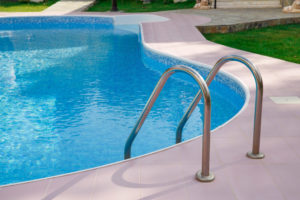 In spite of substantial safety enhancements over the past several years, swimming pools continue to present great risks for property owners and their guests. Statistics compiled by the Consumer Products Safety Commission, for example, reveal that accidental drowning is one of the top causes of fatalities among children younger than 14, and that for a two-year period between 2015 and 2017, more than 6,400 children received treatment in hospital emergency rooms for non-fatal swimming pool accidents.
In spite of substantial safety enhancements over the past several years, swimming pools continue to present great risks for property owners and their guests. Statistics compiled by the Consumer Products Safety Commission, for example, reveal that accidental drowning is one of the top causes of fatalities among children younger than 14, and that for a two-year period between 2015 and 2017, more than 6,400 children received treatment in hospital emergency rooms for non-fatal swimming pool accidents.
The premises liability attorneys at Kantrowitz, Goldhamer & Graifman want to help swimming pool owners in New York and New Jersey to enjoy their pools with minimal risks or injuries. These swimming pool safety tips can help to keep your pool environment safe while increasing your overall levels of comfort and pleasure with your pool.
7 Swimming Pool Safety Tips
The American Red Cross and other swim safety organizations generally recommend that swimming pool owners take the following precautions to keep their pools safe and secure:
- Erect fences and other barriers that are at least four feet tall around a pool to control access to it. Check with local building codes and property association guidelines to verify the types of fences that are required or allowed.
- When you are not using your pool, cover it, remove ladders and other access devices, and install a motion sensor to alert you when someone enters the pool.
- Do not allow anyone to swim in your pool alone or without supervision, even if that person is an experienced swimmer. A slip and fall accident can render a person unconscious and can quickly lead to fatalities around unattended pools.
- Keep your pool filter clear of debris and test and maintain chemical levels to reduce the risk of bacterial contamination. Check filter intakes to confirm that they do not create a suction risk that might hold a smaller person underwater.
- Avoid the use of glass or other breakable beverage containers around your pool. Broken glass near pool surfaces can cause serious injuries to barefoot swimmers.
- Verify that safety and recovery devices, including throw ropes, buoys, and shepherds crook life hooks, are readily available near your pool.
- Install non-slip coatings for easier walking around a pool with a reduced risk of slipping on wet surfaces.
Swimming Pools and Premises Liability Issues
Liability for swimming pool accidents is governed by applicable standards of premises liability. A pool owner owes a greater duty of care to his or her guests and to other persons who are permitted to use the pool. That duty extends to keeping the pool and its surrounding premises safe from undue risks, and to warning pool users of other known risks, including, for example, shallow areas of a pool that are inappropriate for diving or deep areas that could pose a drowning risk for small children and weaker swimmers.
A pool owner owes a lower duty of care to someone who trespasses onto his or her property to use a pool without permission, but pool injuries to trespassers can still create liabilities for pool owners, particularly if the trespasser is a younger child who saw the pool as an “attractive nuisance”.
In all cases, the liability of a pool owner to a person who suffers a swimming pool injury will depend upon the specific facts of each case. Because statutes of limitations and other procedural rules can limit an injured party’s ability to recover damages in a swimming pool accident case, the best course of action following any pool injury is to contact an experienced premises accident attorney as soon as is possible in order to start any litigation before that statutory period expires.
Contact the Premises Liability Attorneys at KGG for Representation in Swimming Pool Accident Cases
The New York and New Jersey premises liability attorneys at Kantrowitz, Goldhamer & Graifman hope that you, your family, and your guests get the maximum amount of enjoyment during the summer swimming season. If, however, you do suffer a swimming pool injury in Bergen County, Rockland County, or surrounding communities, we urge you to contact us at your earliest convenience to protect your rights to recover damages for your injuries from any negligent parties that have not implemented appropriate safety procedures. We will challenge any insurance company settlement offers that undervalue the cost of your injuries and we will get you the compensation you need to help you recover from your injuries and to get you back to the pool as quickly as is possible.
Additional Resources:
- Redcross.org: Home Pool Safety. http://www.redcross.org/get-help/how-to-prepare-for-emergencies/types-of-emergencies/water-safety/home-pool-safety
- Poolsafety.gov: CPSC Calls for Increased Water Safety Efforts as Summer Swim Season Arrives. https://www.poolsafely.gov/news/cpsc-calls-for-increased-water-safety-efforts-as-summer-swim-season-arrives/
- Swimmingpool.com: Safety Guidelines. https://www.swimmingpool.com/pool-living/pool-safety/safety-guidelines
